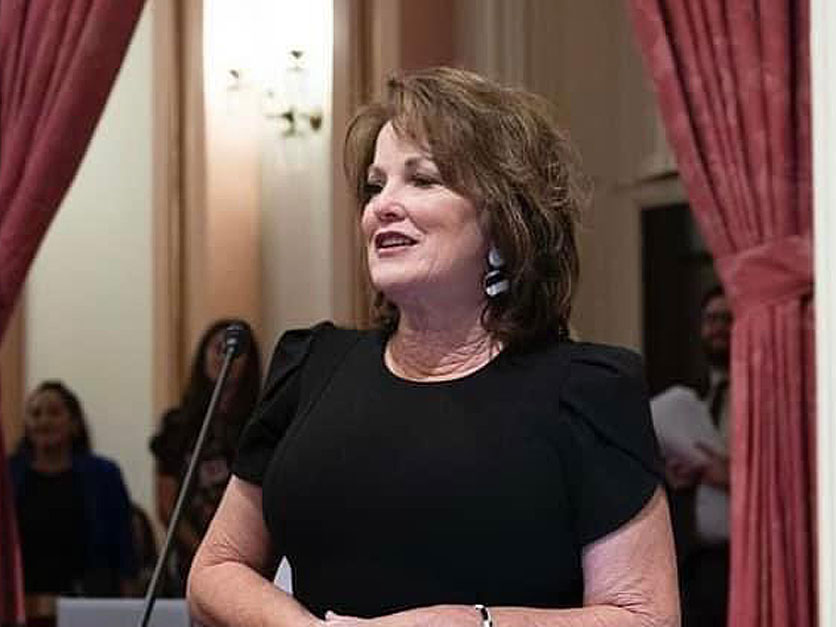As California races to meet new clean energy deadlines, lawmakers in the Legislature are growing increasingly uncomfortable about the potential cost to residents and businesses in their districts. Those concerns filled a hearing last week for the reappointment of Cliff Rechtschaffen to the California Air Resources Board.
Gov. Gavin Newsom selected Rechtschaffen in September to serve as the newest board member, as the agency gears up to implement new regulations phasing out fossil-fuel-powered cars, trucks, trains, locomotives and forklifts. Rechtschaffen had served in a similar leadership role at the California Public Utilities Commission for five years.
“That gives you a distinct advantage,” said Senator Shannon Grove, R-Bakersfield, during a Senate Rules Committee hearing considering the appointment last week. “You have the knowledge of how the Legislature and governor's policies impact [your work] and how being on the California Air Resources Board impacts the cost of utilities.”
Grove pressed Rechtschaffen for solutions that would enable the state to meet its goals without creating burdens disproportionately impacting small businesses, the middle class, and costs for goods and energy. Rechtschaffen agreed that the agency needs to be “very conscious of the most cost-efficient ways” to clean the air and pointed to various programs at CARB and other energy agencies designed to keep costs down.
“We need to have a whole-of-government approach to deal with the climate problem,” he said. “A very important part of that effort is to make sure that rates are affordable to people.”
 Sen. Shannon Grove, R-Bakersfield
Sen. Shannon Grove, R-BakersfieldYet Grove worried the policies would punish Central Valley farmers who cannot connect to the grid to charge their electric forklifts, for example. She raised concerns about converting locomotives to zero emissions when the technology is not commercially available.
“Is there something on the horizon that you know about that we don't?” she asked.
Rechtschaffen stressed that every regulation incorporates exemptions when electrical upgrades cannot keep pace with the demand or the technology fails to materialize as fast as anticipated. The forklift rule exempts businesses with fewer than 50 vehicles with less than $50 million assets and grants longer compliance timelines for rural areas and agricultural users. He pointed out that CARB delayed enforcement when the pandemic shut down businesses and supply chain disruptions stalled infrastructure equipment.
It's easy to be "in the know" about agriculture news from coast to coast! Sign up for a FREE month of Agri-Pulse news. Simply click here.
Grove and the other Senate Republicans have bashed the administration and Democratic lawmakers for a potential hike in fuel prices of 47 cents per gallon due to a proposed update to the Low Carbon Fuel Standard. Grove charged that such a cost would disproportionately impact Californians in the Central Valley, who drive more miles compared to residents of large cities with extensive public transit options, such as Los Angeles and New York. Rechtschaffen countered that the estimate of 47 cents is the worst-case scenario staff had outlined within an economic impact assessment for the draft regulation.
“It's very hard for many reasons to predict what the impact of a program is going to have on gas prices, he said, noting that the market is not transparent and factors like the price of crude oil and refinery outages play a larger role in the overall price. “We're trying very hard to get a better handle and more transparency on what causes prices to increase.”
He cited a recent report from the California Energy Commission blaming refining distribution and marketing activities for 80% of the increase in gas prices. He described the affordability problem as “very big and important” and vowed to “continue to look at this issue very carefully.”
Sen. Susan Eggman, D-Stockton, who leans progressive, worried about the agricultural industry surrounding her city.
“How do we continue to produce the best food in the world here in California as it comes in conflict sometimes with a lot of our climate goals?” asked Eggman. “Our farmers—and everybody—feel a lot of pinches.”
Rechtschaffen pivoted to the California Department of Food and Agriculture and praised its efforts to move the industry toward more sustainable and climate-smart practices.
“It's a tough question. Some practices will have to change,” he acknowledged. “But we want to do it in a way that we have a sustainable agricultural community.”
He gained accolades from Grove for his conversations with dairy farmers in her district over policies relating to manure digesters.
“Ideologically, we are way on different sides of the spectrum,” said Grove. “But you listen. You take into consideration. You try to mitigate those things to bring people more to the middle.”
Rechtschaffen earned endorsements from Western United Dairies and biodiesel producers, along with environmental groups like the Union of Concerned Scientists. The lawmakers unanimously approved his nomination.
For more news, go to Agri-Pulse.com.


